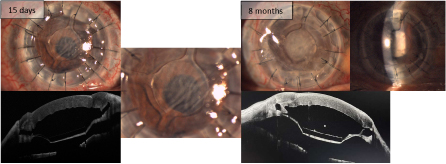A training course, marked by important encounters, to arrive at the full realisation that 'the most important rule in surgery is flexibility and the ability to adapt to the conditions that arise, after all it is like in life'.
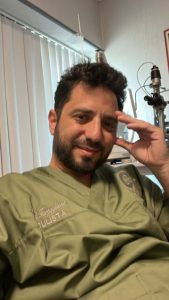
In this interview, Dr Marco Zagari 'tells his story', reviewing the most important encounters that have marked his training. He demonstrates great passion and determination even in his approach to a clinical case that seemed truly hopeless, but instead...
How did you choose your training in Ophthalmology and what is your current professional profile?
I am a surgeon ophthalmologist, co-founder of the European Centre of Ophthalmology, founded on the initiative of my father, the Dr Francesco Zagari. I inherited my passion for ophthalmology from him, who was head physician at the Cannizzaro Hospital in Catania and unfortunately passed away prematurely during my university years. I still remember the 'escapades' in the operating theatre to spy on what he was doing.
I was able to cultivate my passion for research in Ophthalmology, thanks to the Prof. Alfredo Reibaldiwho has been a moral guide and has given me the opportunity to deepen my knowledge of this discipline and to carry out internships at various hospitals and research centres in Italy and abroad.
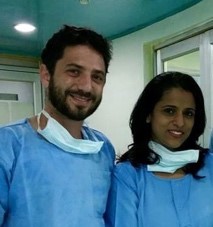 During my specialisation, I had the opportunity to study glaucoma surgery at the Udine Hospital with the Dr Paolo Brusini. I then continued my training with the Prof. Amar Agarwal in India, where I got to know the Dr Soosan Jacobwhich made me fall in love with corneal surgery, making complex concepts simple, and which still represents an important reference point for my profession today. Subsequently, I also continued to enrich my profile through experience in humanitarian missions, such as the mission 'Vision Project 2016' in Nicaragua, where I performed surgery 'pole to pole' to improve the eyesight of people in need.
During my specialisation, I had the opportunity to study glaucoma surgery at the Udine Hospital with the Dr Paolo Brusini. I then continued my training with the Prof. Amar Agarwal in India, where I got to know the Dr Soosan Jacobwhich made me fall in love with corneal surgery, making complex concepts simple, and which still represents an important reference point for my profession today. Subsequently, I also continued to enrich my profile through experience in humanitarian missions, such as the mission 'Vision Project 2016' in Nicaragua, where I performed surgery 'pole to pole' to improve the eyesight of people in need.
Currently, together with my brother Silvio, I run the European Centre and continue to dedicate myself to research and scientific dissemination in the field of ophthalmology. Corneal problems have always fascinated me and my training has led me to professional encounters that have turned into real friendships over time, such as with the Prof. Mazzottaesteemed colleague and friend.
My goal has always been to offer my patients the best possible care, combining clinical expertise with technological innovation, and to contribute to the development of innovative, cutting-edge solutions.
Can you tell us about an unusual or particularly complex clinical case that you managed to handle and solve?
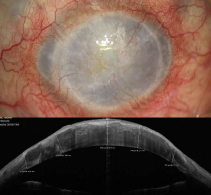 Our profession, full of responsibilities and crucial decisions, confronts us with turning points where the path to follow is never straightforward, which is why it often leads us to say 'stop' when the situation becomes an alleged 'therapeutic obstinacy'.
Our profession, full of responsibilities and crucial decisions, confronts us with turning points where the path to follow is never straightforward, which is why it often leads us to say 'stop' when the situation becomes an alleged 'therapeutic obstinacy'.
I bring you, for example, the story of a young man, aged 53, with a history of multiple surgeries (retinal detachment, cataract, vitrectomy and 4 perforating transplants) following perforating trauma in the right eye.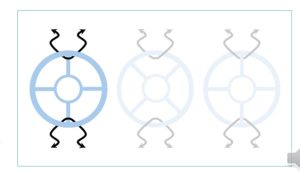
This is the typical case in which the anterior segment ophthalmologist often finds himself helpless, also because, considering the type of clinical case, the risk of rejection is a certain eventuality in more than 90% of cases.
Although I had done various searches in the literature and sought the advice of more experienced colleagues, I had not come up with any solution that could be decisive. That was until my professional path crossed that of Prof. José Alfonso of the Fernández-Vega Institute, who proposed that I enrol this patient among the possible candidates for a EndoK pro, as an alternative to a ![]() Boston keratoprosthesis implantation surgery.
Boston keratoprosthesis implantation surgery.
This was the first case treated in Italy and, during a call, he explained a new concept of corneal transplantation that could be applied in these immunologically compromised cases.
It is a 'spacer' of the pre-desemetic PMMA membrane, the mechanical separation generates an anterior pseudo-chamber, independent of the anterior chamber, which is in fact not altered by the implantation of the donor cornea and the prosthesis.
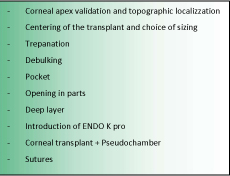 The critical issues of the case were multiple, the choice of prosthesis diameters, the construction of the peripheral pocket, the diameter of the donor cornea and the success of a deep lamellar keratoplasty in multiple keratoplasty outcomes. After planning with the prosthesis designer, we outlined the surgical steps and proceeded with the surgery.
The critical issues of the case were multiple, the choice of prosthesis diameters, the construction of the peripheral pocket, the diameter of the donor cornea and the success of a deep lamellar keratoplasty in multiple keratoplasty outcomes. After planning with the prosthesis designer, we outlined the surgical steps and proceeded with the surgery.
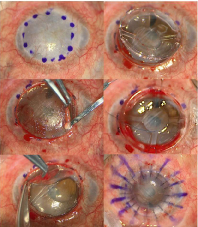 The day of surgery was definitely emotional, with Prof Alfonso's final recommendations until the end of the surgical procedure.
The day of surgery was definitely emotional, with Prof Alfonso's final recommendations until the end of the surgical procedure.
Subsequent post-operative follow-ups have shown great success, although, to date, it is extremely premature to speak of stable surgical success over time, but follow-up will certainly provide new answers. Vision is not affected by the prosthesis, but it confers a sort of refractive stability given by the PMMA plate; after about a year, a surgical procedure will be necessary to remove the thickened and opaque descemet layer where the immunological reaction was concentrated. Only after the removal of this will it be possible to speak of treatment stability.
The journey, however, is not yet complete: further work will be needed to consolidate long-term success, but the direction is set towards a future of renewed possibilities.
A few tips for young colleagues starting out in Ophthalmology.
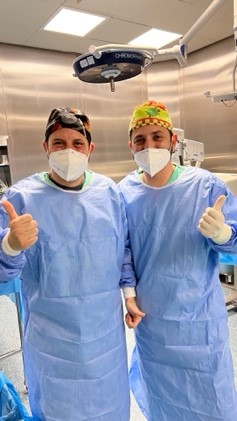 The surgeon is not so different from an artist; instead of using a paintbrush, he or she juggles a scalpel or whatever, as a means of expressing creativity, along with passion and instinct. Every surgeon is unique, every operation is a work of art, unique in its kind and successful when it helps people improve their quality of life.
The surgeon is not so different from an artist; instead of using a paintbrush, he or she juggles a scalpel or whatever, as a means of expressing creativity, along with passion and instinct. Every surgeon is unique, every operation is a work of art, unique in its kind and successful when it helps people improve their quality of life.
Cultivate your passion: ophthalmology is a fascinating and constantly evolving discipline. Love the profession and always be curious about new techniques and discoveries, after all, love involves knowledge.
Take advantage of all available training opportunities, internships and specialisation courses. Maintain a humanitarian approach and do not lose the humility to learn from mistakes, these opportunities are an important gift not to be wasted, because every mistake brings a gift with it to those who know how to seize it.
Always remember that behind every clinical case there is a person with his or her own story, who needs care and support.
Have fun, find a healthy balance between work and personal life. Ophthalmology can be challenging, which is why you will discover the importance of 'work -life balance', because a great professional must not forget that he or she is also a Man, and to do this, he or she will have to take care of maintaining optimal mental, emotional, relational and physical health. This will make your journey a journey of ups and downs, which will open you up to new horizons. Face the challenges with determination and commitment, knowing that each clinical case is an opportunity for learning and professional growth.
I was taught and studied strict rules, during my studies in medicine, I had the opportunity to admire all surgery with interest, and I realised that the most important rule in surgery is flexibility and the ability to adapt to the conditions that arise, after all it is like in life. I have made my profession an art and, like any artist, the only limit I set myself is what I can imagine myself doing. When the lights go out the show begins, like in a concert you feel the music in your hands, then you know you are doing well.
On the subject of corneal transplants see
- Therapeutic corneal transplantation in Acanthamoeba keratitis: comparing techniques - Oculista Italiano
- First corneal epithelial stem cell transplantation - Oculista Italiano
Under the heading "I tell you a story..."
- "The more I like doing something..." - Italian ophthalmologist
Interview with Dr Silvio Zagari - 'Give a woman the appropriate opportunities and...' - Italian Ophthalmologist
Interview with Dr Manuela D'Aquino - Open up to the world!!! - Italian Ophthalmologist
Interview with Dr Miguel Rechichi - The 'allologist' is a thing of the past - Oculista Italiano
Interview with Dr Francesco Cerbella - Broadening our views - Oculista Italiano
Interview with Dr Pasquale Napolitano - Basic skills in each subspeciality - Oculista Italiano
Interview with Dr Beatrice Tombolini - Let your heart lead you too - Oculista Italiano
Interview with Dr Danilo Mazzacane - The privilege of caring for people - Oculista Italiano
Interview with Dr Giovanni Scandura - "Travelling a lot to learn... - Oculista Italiano
Interview with Dr Federica Fossataro - The best refractive solution for each individual patient - Oculista Italiano
Interview Dr. Antonio Randazzo
Editorial info
Our column is open to all ophthalmologists who are interested in telling their colleagues and our web audience about a clinical case.
We invite anyone wishing to participate in our publishing project to contact
Editorial Board 'l'Oculista italiano' - Ada Puglisi
Tel. +39 095 79.22.145
E-mail: info@oculistaitaliano.it
Or write to us using one of our contact forms

